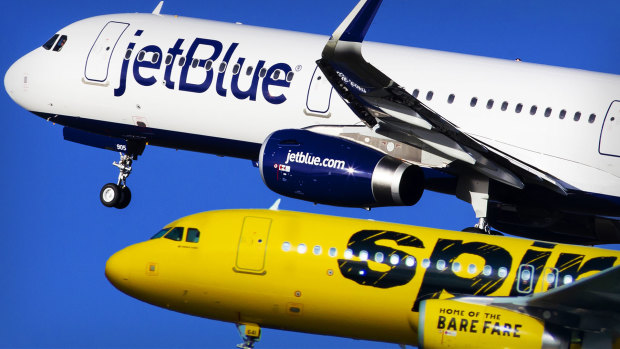
Redacting sections of documents is a common practice understood to be necessary for many reasons.
In general, the purpose is to hide details in the documents that are considered confidential or sensitive.
DON'T MISS: Southwest Airlines making huge boarding process change
When mistakes are made with technical implementation of redactions, that sensitive information can be unintentionally revealed.
Several months after JetBlue (JBLU) -) announced plans to acquire Spirit Airlines (SAVE) -) in July of 2022, the U.S. Department of Justice (DOJ) sued to block the deal.
The DOJ said the acquisition would allow JetBlue to eliminate its largest ultra-low-cost rival. It said that would further concentrate the airline industry and harm travelers.
On the other hand, JetBlue has argued that having another competitor to airline giants American Airlines (AAL) -), Delta Air Lines (DAL) -), United Airlines (UAL) -) and Southwest Airlines (LUV) -) would be good for consumers.
In March 2023, a group of Spirit customers also filed a lawsuit against the merger. It claimed JetBlue's acquisition of Spirit would violate the Clayton Antitrust Act.
It was in the context of the civil action that a redaction mistake appears to have been made.
Pricing plans unintentionally revealed
In a document, redacted sections were revealed.
In a statement Thursday, New York-based JetBlue said lawyers for the consumers "failed to properly redact certain information which, taken out of context, creates a completely inaccurate picture of the facts. We are confident that our merger with Spirit will give a much-needed boost to airline competition in the U.S. and result in more low fares and higher-quality service for customers," the Associated Press reported.
According to travel site One Mile at a Time's Ben Schlappig, some of the revealed highlights include some important information.
The merger "modelled for price increases and capacity reductions," by removing an average of 24 seats "from every one of Spirit's roughly 200 planes."
"JetBlue plans to increase fares on aircraft it acquires from Spirit by at least 24%," and this "is a conservative estimate, and that fare increases may be as high as 40%."
"JetBlue acknowledges that Spirit's exit from a route results in market-wide price increases of all other airlines serving that route by 30%."
Schlappig says he does not think these revelations should come as much of a shock.
"Some are suggesting that these quotes are somehow a smoking gun that will definitely cause the merger to be blocked," Schlappig wrote. "Okay, admittedly the optics are bad ('we’re going to raise prices!'), and I assume that some will look to score political brownie points for protecting consumers and keeping fares low."

Shutterstock/TS
The relative impact of the leak is considered
But the travel expert plays down the level of scandal involved in the revelation.
"Sure, base fares on Spirit might go up by 24%-40% if Spirit planes join the JetBlue fleet, but that doesn’t necessarily mean people will be paying 24%-40% more than before," Schlappig wrote. "Spirit nickels and dimes for everything, while JetBlue doesn't, so I think it would be more valuable to compare the overall amount people are spending to fly, rather than just base ticket costs."
Schlappig also brings up a couple specific examples that lead him to conclude there is some cloudiness about the bargain-fare airlines compared to higher cost airlines in the first place.
"I think the whole argument that ultra low cost carriers have low fares and that other airlines have high fares just isn’t accurate or fair," he wrote.
"I mean, JetBlue has $89 fares between Miami and Los Angeles ($124 with a full size carry-on), while Spirit has $336 fares between Tampa and Fort Lauderdale (without a carry-on), so it really depends on the flight you’re looking at."
A JetBlue spokesperson provided TheStreet with the following statement:
To be very clear, the claims reported by several media outlets did not reflect facts set out in JetBlue documents. Private plaintiffs represented by the merger class action lawyer, Alioto, in a the court filing laying out their arguments opposing our motion for summary judgment, incorrectly redacted sections of text so that it could be read by cutting and pasting into a new document. As we attempted to clarify yesterday, it is important to understand that the redacted text was content written and produced by Alioto in their own court filing, not redactions to JetBlue internal documents. These redactions were in text where Alioto had outlined, in their own words, their argument to the court, and essentially represents the plaintiff’s "spin" on confidential evidence they have reviewed. It’s no surprise a class action attorney would mispresent the facts in a brief to the court to preserve their case.
The factual evidence, when presented in a full and complete picture, will demonstrate that JetBlue intends for the merger with Spirit to increase competition and help lower fares across the board while also bringing JetBlue’s high-quality and much-loved experience to millions more travels.
Get exclusive access to portfolio managers and their proven investing strategies with Real Money Pro. Get started now.







